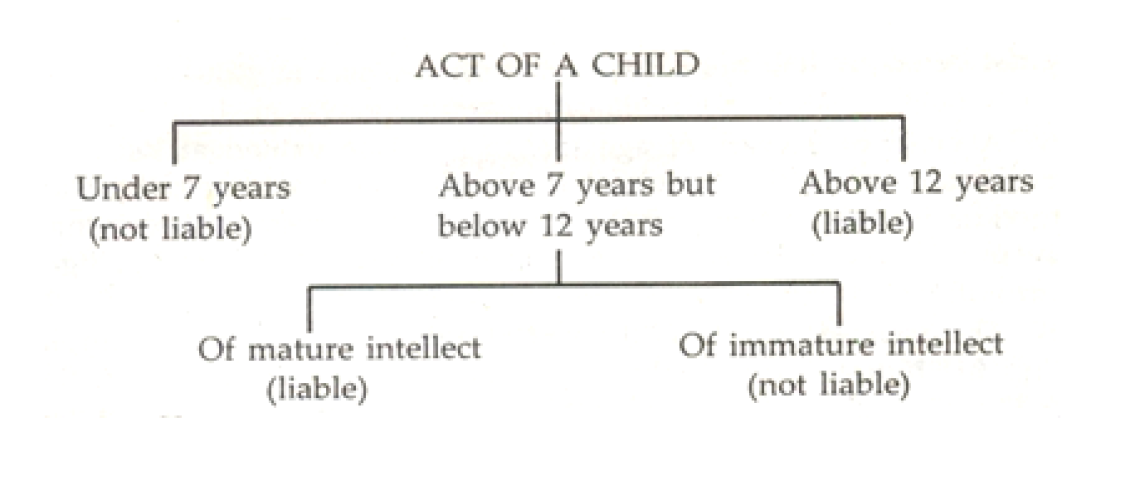By Krishna Pallavi
According to the past years paper pattern, almost 25% of the questions in legal reasoning are seen to have come from the general exceptions under criminal law.
These questions can sometimes be very tricky. However, to tackle such problems with flair, you need to understand the concepts well.
Along with the concepts try to practise different types of legal reasoning questions. This will give you a hand over all the types of situations that could be asked under legal reasoning section.
This post contains the concepts and understanding of General exceptions.
Sometimes it so happens that a person commits an offence punishable under law but had no intention in doing so.
For example, Jack buries Jill assuming her to be dead. In such a case Jack should be held liable for the offence; but did Jack have a guilty intention (which is the utmost important element that constitutes a crime) to bury Jill alive? No!
Hence, Jack is not liable. Therefore, in order to protect innocent people like Jack, criminal law had laid down the following general exceptions to crime. The general exceptions are spread across Section 76-106 of the Indian Penal code.
1. Private Defence
Private defence is a basic human instinct that is recognized under law. Any act done by a person to protect himself or his property is considered to be private defence.
For example: Assume that you were playing cricket in your neighbourhood and the most annoying dog of your neighbourhood, ‘Don’,starts running behind you furiously.
In order to save yourself, you throw the cricket ball in your hand at the dog thereby killing it. The master of Don files a case against you. Would you be held liable for killing Don? No! You have the exception of private defence at your rescue.
Note-1: The defence used by a person in order to protect himself or his property must be reasonable and proportionate.
For example: Jim’s father hits Jim for stealing money from his pocket in order to teach him a lesson. To stop his father from hitting him, Jim takes the lathi beside him and hits it on his father’s head leading to his death.
Would Jim be saved? No! In the instant case, unlike the previous, Jim could have used other means to stop his father from hitting him.
The “other means” here include any way which causes lesser injury to the other person, while serving the purpose of protecting the person himself (Jim could have run away or called for help in this case). Therefore, the force used by Jim as private defence in the present case is unreasonable. Hence, he can be held liable.
Note-2: The right to private defence of the body exists against any offence towards human body. The right to private defence of the property exists only against an act that is either theft, robbery, mischief, or criminal trespass or is an attempt to do the same.
2. Involuntary Intoxication
Any act done by a person who under involuntary intoxication is incapable of knowing the nature of his act, is excusable under law.
To claim this exception, two essential grounds should be taken care of:
(i) Intoxication should be without the knowledge or will of the person.
(ii) The intoxication is of such nature that it puts a person in a state, where he is incapable of knowing what he is doing or that it is against law.
To understand this concept better, let us consider the following situation:
You are a total teetotaller. Once, you were invited to your friend’s birthday party at his farm house. A few of your other friends, in order to see the chaos that you could create while drunk, pour alcohol into a glass of coke and give it you.
You had no knowledge or the will to take alcohol that evening. After drinking the alcohol mixed with coke you get into a fight with your ex-girlfriend and injure her physically.
Will you be held liable? No, because you neither had the knowledge nor were you in a state to understand the situation. Therefore, you are exempted under this exception as the act was involuntary.
Consider another situation: you were a frequent drinker and your friends give you a drink which contained 90% of alcohol and 10% of coke. Due to this composition, the drink had a peculiar smell of alcohol. After taking this drink you get into a fight with your ex-girlfriend and injure her.
Will you be liable under this case? Yes! Why? Unlike the previous situation, here you were presumed to have the understood the inclusion of alcohol in the drink. In this case, your act was a voluntary act.
3. Acts Done by Children
Children are often exempted from criminal acts, due to their tenderness of not understanding the consequences of the act. However, to consider children under this exemption, they are classified into three categories.
(i) Children below 7 years of age: Children under this age group are exempted from any criminal act.
(ii) Children between 7-12 years of age: Children under this age group are exempted from the criminal acts, unless they had the knowledge of the consequences of the act.
For example: Johnny aged 8 years found a ruby necklace of his aunt and keeps it with him. Later when the police visits Johnny’s place for investigation and asks about the necklace, Johnny doesn’t tell them that the necklace was with him.
In this case, despite Johnny being 8 years old can be held liable as he purposefully did not return the necklace which amounts to theft.
(iii) Children above 12 years: Criminal acts done by children above 12 years are treated as equal to the criminal acts committed by adults. However, according to Juvenile Justice (Care and protection of children Act) 2015 the punishments allotted to children for various offences is lesser than that of the adults.
4. Acts to prevent Greater Harm
Any act done with bona fide intention to reduce greater harm in a particular situation is not considered to be a criminal act by the law.
For example: A woman throws her baby out from the top of a burning house which caused the baby various injuries. In this case the woman is not guilty as she had done this act in order to prevent a greater harm.
5. Acts Authorized By the Law or the State
No act is considered to be an offence if it is done by a person who is authorized or bound by law to do that act. This also covers the exemption of mistake of fact. However, note that ignorance of fact is excusable under law but not ignorance of law.
For example: A Police officer detains a wrong person in his custody. In this case the police officer is not liable as it comes under mistake of fact.
However, if a police officer arrests a person and doesn’t present him in front of the magistrate within 24 hours, he cannot take the claim that he had no clue about it. This amounts to ignorance of law which is not excusable under law.
6. Unsoundness of Mind
A person considered to be of unsound mind is exempted from any criminal charges against. The condition is that at the time of commission of the crime he must be unaware of the nature of the act or its consequences.

For example: A person suffering from a mental condition takes a knife and stabs his neighbour to death. Later he goes back to his place and takes a bath in order to clean the blood stains.
Following this, he also disposes of his clothes that had blood stains and hides the knife. In this case, it can be shown that the person despite suffering from unsoundness of mind knew the nature and the consequences (as he disposed his clothes and hid the knife, knowing it is a offence ) of the act and therefore can be held liable.
Therefore, if the defendant has to avail the above exceptions in order to escape punishment, he has to prove that he did not have a guilty intention to do that particular act.
Note- Join Top-rated clat coaching classes to solve legal reasoning very easily. You can also opt for joining clat online classes for better guidance.






